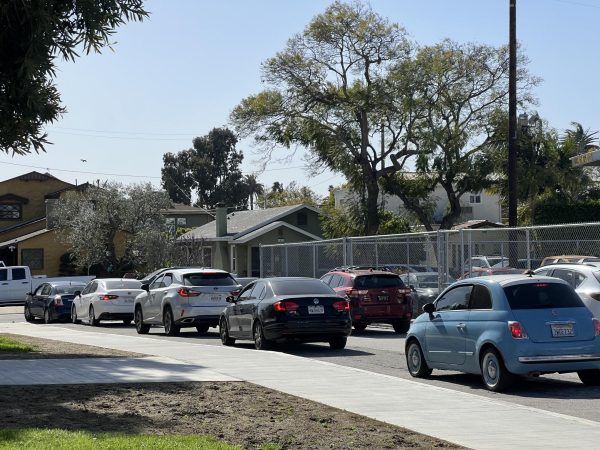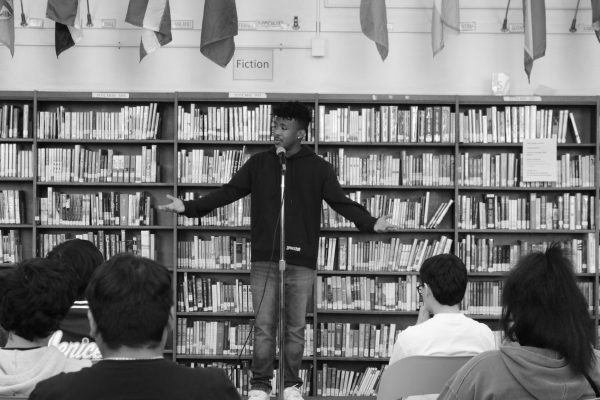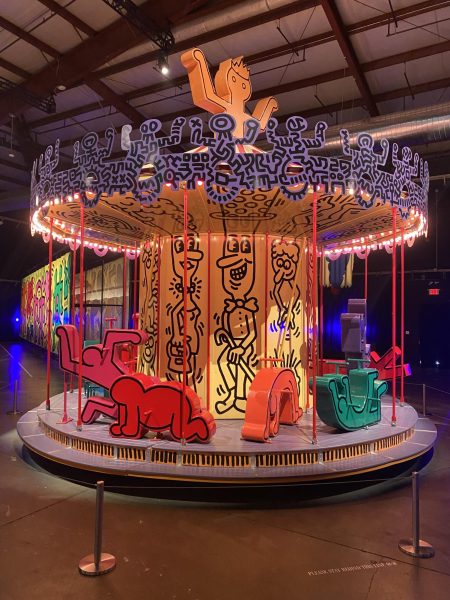A Missing Dad and Growing Up in the Rural Midwest
Humans of Venice High
April 4, 2018
Humans of Venice High is a series of photographs and personal histories, revealing the hidden emotions. Two Oarsman staffers, Alicia Valenciana and Julissa Ventureno, went around school campus, asking faculty members if they would mind being interviewed regarding their personal stories.
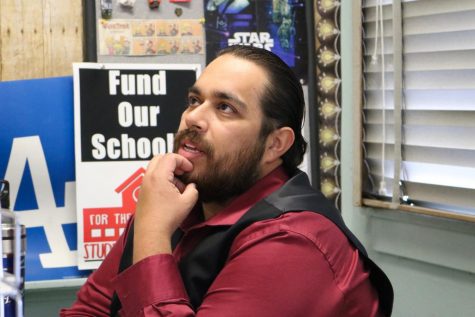
English teacher Marcos Sandoval talks about his father.
When asked about some of his greatest struggles, Marcos Sandoval, an English teacher, referred to the fact that his father was not in his life. “My dad was heavily into drugs and he was abusive. My mother finally realized that it wasn’t an environment that she wanted to raise her children in, so she left him. So that’s the reason he wasn’t around. I think he was around until I was around 5 years old.
“For the longest time, I felt like I blamed myself for him not being around. I always questioned if it was something I did. I feel like a lot of people, when one parent is there and one isnt, you kind of question if you were to blame for that. Because like I said, he wasn’t around that long when I was growing up. I was five years old and my sister was eight. I didn’t have many memories of him.
“It was challenging. At least I felt like, at times, I didn’t have somebody I could go to and ask for advice. At least growing up, I didn’t really see that I had anyone else to talk to about things. I could always approach my uncles or grandfather, but it felt different. Because I heard stories of my friends growing up and what their dads helped them do or the things they got to do with their dads or like my cousins who have their fathers around would go on camping trips, baseball games, all these things that they go to do. Not to sound chauvinist or anything, but like the “man-things” that they got to do.
“It was definitely rough. A lot of times, I don’t think I realized what my real issues were until I became an adult. I had gotten into a lot of trouble growing up. I didn’t really think about what my biggest issue was until I was a lot older, maybe until my late teens, early twenties that I started realizing oh maybe that’s the reason why I did a lot of the things I did growing up. Or maybe that’s why I was always looking for a certain type of attention from my grandfather or always wanting to hang out with my uncles or joining baseball or Boy Scouts. You know, wanting to prove myself as a man, even though I didn’t have one in my life that I could look up to.”
Did you ever blame your mom for ever leaving your father?
“No, because my mom was open about why he left. Even as a kid I felt like, yeah that makes sense. My mom always made sure that we understood that she was doing it not for herself, but for us. My mom had always put us before her. I appreciated that.”
“Sometimes that made me even more upset with the fact that I don’t have a dad and I even blamed him more because he wasn’t willing to stop doing all the negative things that he was doing to do something good for his family.”
“My mom struggled raising us. She provided food, clothing, a shelter for us, but I know it wasn’t easy for her. Even now looking back, I can’t believe she was willing to do all these things and to suffer through these things and to not complain or blame us. I would get upset sometimes when my mom would buy us something that I thought was too expensive. Like this is not what you should be using the money on.
“I remember one Christmas that she bought us (this is going to show how old I am) a DVD player. We unwrapped it and I was like ‘what’s this?’ She’s like ‘it’s a DVD player!’ Instead of being that kid that was like ‘Oh my God, I can’t believe that you bought this for us.’ I was really upset with her like ‘Why would you do that? Why would you waste your money? You should be getting the car fixed or going to do this or paying for that… you didn’t need to buy us this.’ But she was always like that.”
“She was always willing to put us before anything else. She worked three jobs when I was a student growing up. She was a preschool teacher. She still is. She worked an after school program and she also worked a graveyard shift at Big Lots. A lot of times I would see her intermittently between shifts.”
“When she finished her after-school program, she would come home and eat. We would hang out or she would cook us dinner, actually. Then she would take off to go to Big Lots and we would be asleep most times by the time she got back home. I wouldn’t see her again until the morning when she would wake me up to go to school.”
“My mom played both roles. My mom is cool. I always think my mom is pretty cool because she was willing to sacrifice a lot of her wants and needs to provide to her family. Of course she had help from my aunt. Or my grandparents helped us out by giving us an opportunity to live here in this community. I know my mom definitely sacrificed a lot just to make us happy. I don’t hold any resentment towards her for any of that.”
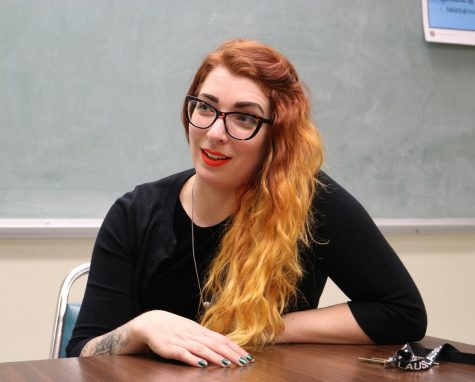
Senior Office Technician Hannah Caudill talks about her home environment.
Hannah Caudill, a Senior Office Technician, said, “I grew up in the midwest rural. There are very, very few jobs and very little opportunities for careers. A lot of people don’t leave, it’s a really small town. My high school is actually where they presented ‘No Child Left Behind’ because we were the poster child. There was a very low graduation rate. So I started working full time when I was 16. I had three jobs through college. It’s a different aspect there. I moved here… it’s better.
“I was on my own really early, mostly. There was not a good environment at home and it was easier for me to just support myself. I started when I was 17. I was living with friends. It was hard to learn, but I appreciate it now.
“I learned at 17 and 18 what people in their 20’s start dealing with, like learning how to live with people, having roommates, feeding yourself- which seems easy, but you go to the grocery store and for the first time in your life you’re like ‘I have to fill up my own fridge.’”
Why was your home environment not so good?
It’s definitely different where I’m from. It’s bible belt, very religious, and very right-leaning. Parents were going through divorce. Just normal for the area things. It’s not super open minded. It’s not super culture eclectic. I wasn’t willing to change who I was to stay there. So it was easier for me to leave.”
Who’s the most influential person in your life?
“The most influences I had growing up where…I grew up in a very Christian restrictive household but I went to the library a lot and I read a ton. So I guess for me it would be more fictional characters and authors because I didn’t see myself in my community there, but I was able to read about people or read things from writers that resonated with me and kind of see myself in them that way.
“I’d say that I was pretty isolated as a child because I went to a private school. The only people I knew were either from… it’s a tiny Christian school like my six grade graduating class was nine kids. The whole school only had 100 kids. So up until that age, 12, the only people I knew where from church or from that school.
“Which can be great, 100%, but for me I’m a very inquisitive, questioning person and I like to get different perspectives on things. In that little bubble, you don’t really see much else outside of it. So for me library, reading, that was my outlet, but it’s good to learn… it’s good to have options and choices and come to find things on your own rather than have them chosen for you I think.”
What do you want to be remembered for?
“I think I would want to remembered for standing up for what I think is right. I’m not usually quiet about things. And being compassionate. Be there for other people because you don’t know what people are going through, kind of empathize, try to not take things personally because you don’t know what everybody is going through so just to try hold that space for people and be compassionate about what they may or may not be going through.”
Venice High staff are just like students! There is no difference other than credentials or degrees. People think school staff don’t have a past or their own personal stories, but they do. There is more to them than the subject that they teach, the homework that they give, or the work they do. They are humans, too.
Go to our Instagram @humansofvenicehigh and let us know if you want us to interview a certain teacher or staff member of Venice High! Or if you want past and exclusive stories like this one.


